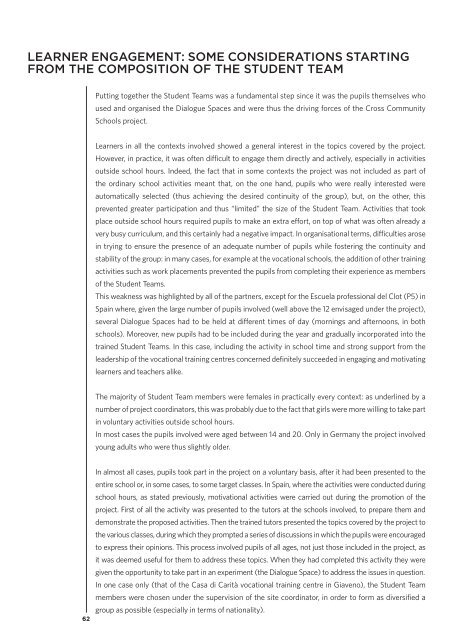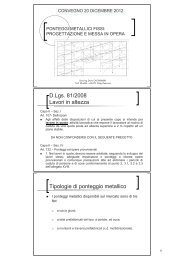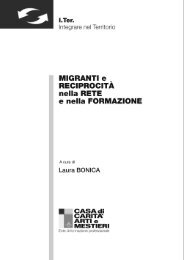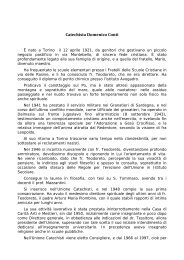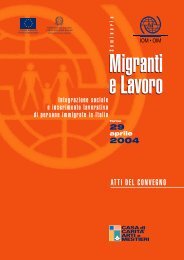Rapporto finale/ Final Report (ITA-ENG) - Casa di Carità Arti e Mestieri
Rapporto finale/ Final Report (ITA-ENG) - Casa di Carità Arti e Mestieri
Rapporto finale/ Final Report (ITA-ENG) - Casa di Carità Arti e Mestieri
You also want an ePaper? Increase the reach of your titles
YUMPU automatically turns print PDFs into web optimized ePapers that Google loves.
LEARNER <strong>ENG</strong>AGEMENT: SOME CONSIDERATIONS STARTING<br />
FROM THE COMPOSITION OF THE STUDENT TEAM<br />
62<br />
Putting together the Student Teams was a fundamental step since it was the pupils themselves who<br />
used and organised the Dialogue Spaces and were thus the driving forces of the Cross Community<br />
Schools project.<br />
Learners in all the contexts involved showed a general interest in the topics covered by the project.<br />
However, in practice, it was often <strong>di</strong>fficult to engage them <strong>di</strong>rectly and actively, especially in activities<br />
outside school hours. Indeed, the fact that in some contexts the project was not included as part of<br />
the or<strong>di</strong>nary school activities meant that, on the one hand, pupils who were really interested were<br />
automatically selected (thus achieving the desired continuity of the group), but, on the other, this<br />
prevented greater participation and thus “limited” the size of the Student Team. Activities that took<br />
place outside school hours required pupils to make an extra effort, on top of what was often already a<br />
very busy curriculum, and this certainly had a negative impact. In organisational terms, <strong>di</strong>fficulties arose<br />
in trying to ensure the presence of an adequate number of pupils while fostering the continuity and<br />
stability of the group: in many cases, for example at the vocational schools, the ad<strong>di</strong>tion of other training<br />
activities such as work placements prevented the pupils from completing their experience as members<br />
of the Student Teams.<br />
This weakness was highlighted by all of the partners, except for the Escuela professional del Clot (P5) in<br />
Spain where, given the large number of pupils involved (well above the 12 envisaged under the project),<br />
several Dialogue Spaces had to be held at <strong>di</strong>fferent times of day (mornings and afternoons, in both<br />
schools). Moreover, new pupils had to be included during the year and gradually incorporated into the<br />
trained Student Teams. In this case, inclu<strong>di</strong>ng the activity in school time and strong support from the<br />
leadership of the vocational training centres concerned definitely succeeded in engaging and motivating<br />
learners and teachers alike.<br />
The majority of Student Team members were females in practically every context: as underlined by a<br />
number of project coor<strong>di</strong>nators, this was probably due to the fact that girls were more willing to take part<br />
in voluntary activities outside school hours.<br />
In most cases the pupils involved were aged between 14 and 20. Only in Germany the project involved<br />
young adults who were thus slightly older.<br />
In almost all cases, pupils took part in the project on a voluntary basis, after it had been presented to the<br />
entire school or, in some cases, to some target classes. In Spain, where the activities were conducted during<br />
school hours, as stated previously, motivational activities were carried out during the promotion of the<br />
project. First of all the activity was presented to the tutors at the schools involved, to prepare them and<br />
demonstrate the proposed activities. Then the trained tutors presented the topics covered by the project to<br />
the various classes, during which they prompted a series of <strong>di</strong>scussions in which the pupils were encouraged<br />
to express their opinions. This process involved pupils of all ages, not just those included in the project, as<br />
it was deemed useful for them to address these topics. When they had completed this activity they were<br />
given the opportunity to take part in an experiment (the Dialogue Space) to address the issues in question.<br />
In one case only (that of the <strong>Casa</strong> <strong>di</strong> <strong>Carità</strong> vocational training centre in Giaveno), the Student Team<br />
members were chosen under the supervision of the site coor<strong>di</strong>nator, in order to form as <strong>di</strong>versified a<br />
group as possible (especially in terms of nationality).


